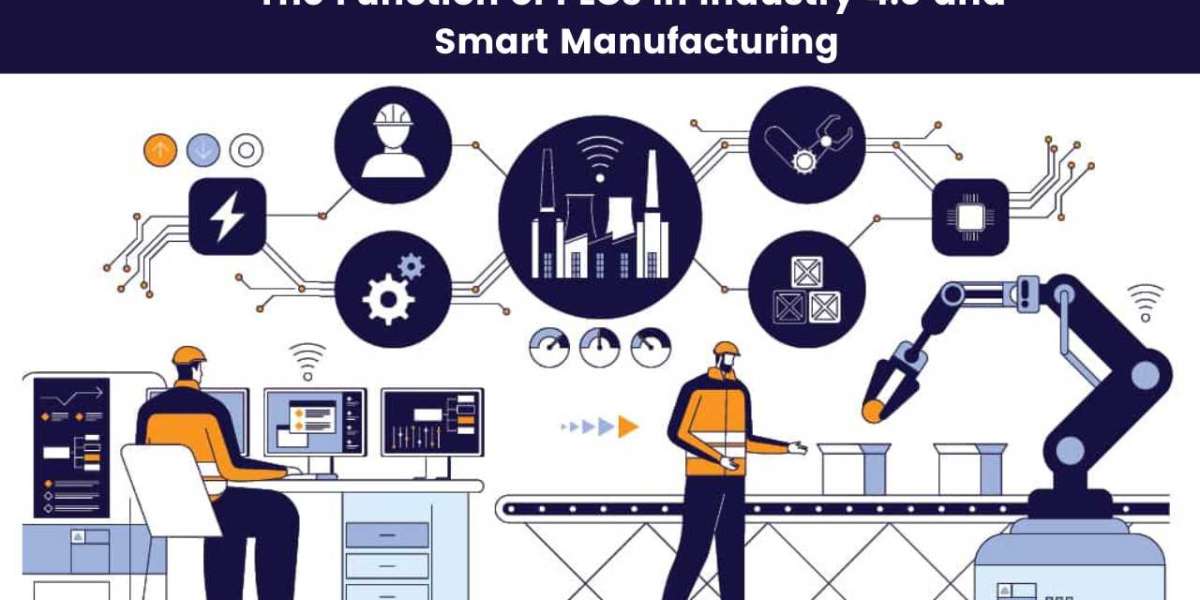PLCs (Programmable Logic Controllers) are essential to Industry 4.0 and smart manufacturing. These innovations aim to facilitate industrial automation, boost output, cut downtime, and enhance overall effectiveness. The goal of smart manufacturing is to enhance the manufacturing process by developing intelligent systems that make use of cutting-edge technology like machine learning, artificial intelligence, and the Internet of Things (IoT).
A wide variety of industrial operations, including assembly lines, material handling, packing, and quality control, are automated by PLCs in smart manufacturing. They make it feasible to combine multiple parts and sensors into a single control system, allowing for the monitoring and management of various operations from a single place.
Because they allow for linked factories with networked machines, gadgets, and sensors that can communicate information, PLCs are crucial to Industry 4.0. This degree of connection enables real-time monitoring of production processes, providing producers with vital information about how to enhance their operations. In addition, the security of users, apparatus, and the environment in which they work depends on PLCs.
The Role of PLC:
PLCs are crucial to Industry 4.0 and smart production because they serve as the backbone of automation systems. Their different duties include managing and monitoring industrial processes, gathering and real-time data analysis, and facilitating connectivity between various systems and devices.
PLCs are essential for the deployment of cyber-physical systems (CPS), which are networks of continuously connected physical and virtual items in Industry 4.0. Due to their capacity to connect with other devices and systems including sensors, HMIs, and cloud platforms, PLCs are essential in the digital transformation of industrial processes.
Furthermore, the most current advancements in PLC technology, such as edge computing, wireless connection, and artificial intelligence, are making PLCs even more versatile and effective in smart manufacturing applications. Rockwell Automation PLCs provide a trustworthy and efficient method for managing and automating industrial operations, which is crucial for achieving Industry 4.0's goals.
How does use PLC in Smart Manufacturing and Industry 4.0
By allowing automation, real-time monitoring, and data analytics in industrial processes, PLCs play a key role in Smart Manufacturing and Industry 4.0. In a manufacturing facility, they are used to monitor and control a variety of machines and devices, such as assembly lines, conveyors, pumps, and valves.
Additionally, PLCs are used in conjunction with sensors, actuators, and other devices to facilitate data collecting and analysis, allowing plant managers to make better informed decisions regarding optimising output, lowering downtime, and enhancing overall efficiency.
PLCs may also be used for predictive maintenance, which uses real-time data to foresee and stop equipment breakdowns before they happen. By minimising downtime and lowering maintenance expenses, this can increase production.
Allen Bradley 1766-L32BWAA MicroLogix 1400 PLCsmart manufacturing, also known as Industry 4.0, is the process of integrating cutting-edge technology, such as automation, artificial intelligence, and the Internet of Things (IoT), to improve industrial processes and boost production productivity. By acting as the principal control system for the devices and procedures utilised in smart manufacturing, PLCs play a crucial part in this integration.
From assembly lines and robots to water treatment facilities and oil refineries, PLCs are utilised to manage a broad range of industrial machinery and operations. PLCs enable firms to monitor and manage their machinery and processes in real-time, resulting in more productive and economical operations in smart manufacturing and Industry 4.0.
Through a range of communication protocols, such as Ethernet/IP and Modbus TCP, PLCs may interact with other hardware and software, including sensors and control panels. The ability to gather and analyse data in real-time allows manufacturers to optimise operations and raise performance.
In order to maintain the process' ideal operating parameters, PLCs may also be designed to react to changes in the production environment, such as variations in temperature, humidity, and pressure. Because less human interaction is required thanks to this automation, productivity is raised and labour expenses are decreased.
PLCs give manufacturers the ability to streamline their operations and improve their ability to compete in a world that is becoming more digital and networked. They are essential components of Industry 4.0 and smart production.
We are Asteam Techno Solutions Pvt Ltd: the go-to company for industrial automation products. We make a contribution to the circular economy by providing all industrial automation products for businesses and factories and also providing service work for them. We provide automation solutions with reputed brands including Allen Bradley, Mitsubishi, Phoenix Contact, Siemens, Schneider, Moxa, VIPA and more. Currently our staff members are serve a growing number of national and international customers each day.


